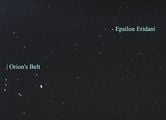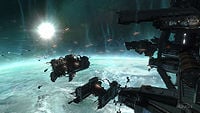Epsilon Eridani system
From Halopedia, the Halo wiki
| There is more information available on this subject at Epsilon Eridani system on the English Wikipedia. |
The Epsilon Eridani system is a planetary system situated 10.5 light-years from Earth[1] and is identified as a region in FLEETCOM Sector One.[2] It was home to several habitable planets colonized by the Unified Earth Government, most notably Reach. At 10.5 light-years from the Sol system, it is one of the closest neighbors of humanity's homeworld.[3]
In the summer of 2552, the Covenant invaded the system and attacked Epsilon Eridani's major colonies. Reach ultimately fell to the Covenant and was glassed,[4] while Tribute was brutally assaulted and at least partially glassed.[5] Following the Human-Covenant War, at least Tribute had been resettled by humanity.[6]
History
By the early 21st century, scientific observation had deduced the presence of an inner rocky asteroid belt, an outer icy belt, and at least three planets: a gas giant the size of Jupiter, and possibly two terrestrial planets, near the inner and outer belts, respectively.[7]
The system was originally colonized by the colony ship Odyssey with the first wave of humanity's extrasolar colonization in 2362.[8] By the late 25th century, the system had become home to many of the UNSC's strongholds and military bases, such as Reach. It was protected by the UNSC Epsilon Eridani Fleet. Before the Fall of Reach, Epsilon Eridani's superior interstellar jump point had been the most active Slipstream space transfer zone (arrivals and departures) for over thirty years, with Epsilon Eridani's inferior IJP and Sol's superior IJP regularly trading second and third place spots.[3]
Humans held the system for several hundred years, until the Fall of Reach in 2552. After that, the system came under control of the Covenant. By 2589, however, humanity had reclaimed the system and had started recolonizing Reach.[9]
Planetary system
The Epsilon Eridani system is home to at least seven planets and two asteroid belts. A massive Oort cloud is located on the outer edge of the system.[10] At least six of the worlds that orbit Epsilon Eridani are known to be inhabited:
- Reach – The former military center of the UNSC, and the most developed human colony. Glassed in 2552 and partially reterraformed by 2589.
- Tribute – A major human colony, known for its strong industrial capacity and large population.[11] Partially glassed during the Battle of Tribute, under UEG control as of 2558.
- Beta Gabriel – largely uninhabited, converted into an outdoors resort by wealthy entrepreneurs. Occupied by a Brute pack during or otherwise soon after the Fall of Reach.[12][13]
- Circumstance – A world famous for its universities and courts of justice. Status unknown.[14]
- Tantalus – A human colony with an unknown status after the Covenant's siege in the system.[15]
- Epsilon Eridani IV – known to be the site of an Insurrection.[16]
Gallery
List of appearances
- Halo: The Fall of Reach (First appearance)
- Halo: First Strike
- Halo 2
- Halo Wars (Mentioned only)
- Halo Legends
- Halo: Evolutions - Essential Tales of the Halo Universe
- Halo: Reach
- Halo: Fall of Reach
- Halo 4
- Halo 2 Anniversary
- Halo: The Fall of Reach (animated series)
- Halo 5: Guardians
- Halo Online (Mentioned only)
Sources
- ^ Cite error: Invalid
<ref>tag; no text was provided for refs namedenc298 - ^ Cite error: Invalid
<ref>tag; no text was provided for refs namedfor343 - ^ a b Cite error: Invalid
<ref>tag; no text was provided for refs namedbnet - ^ Halo Waypoint: Reach
- ^ Halo 4: The Essential Visual Guide, page 177
- ^ Halo: First Strike, Tug o' War (2010)
- ^ Wikpedia: Epsilon Eridani
- ^ Halo Encyclopedia (2011), page 43
- ^ Halo: Reach, campaign level Lone Wolf
- ^ Halo: First Strike, page 232
- ^ Halo: Contact Harvest, "Prologue"
- ^ Halo: The Fall of Reach, page 324
- ^ Halo: Evolutions - Essential Tales of the Halo Universe, "Stomping on the Heels of a Fuss"
- ^ Halo: Contact Harvest, page 62
- ^ Halo Encyclopedia, page 287
- ^ Halo Wars: Official Strategy Guide, page 22


